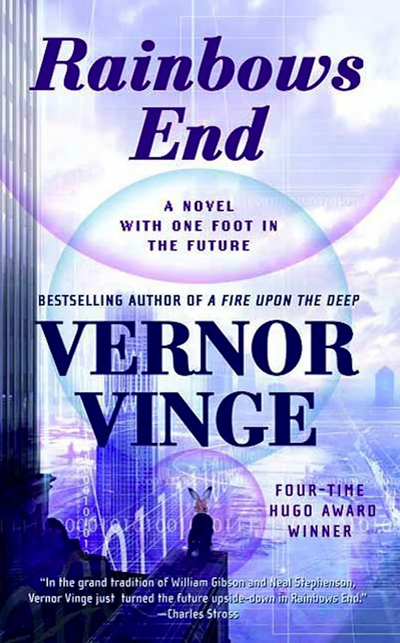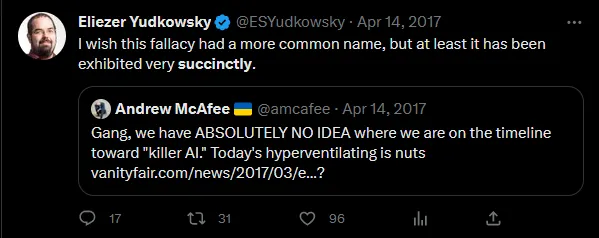David Friedman considers the threat of an artificial intelligence catastrophe and the possible solutions for humanity:
Earlier I quoted Kurzweil’s estimate of about thirty years to human level A.I. Suppose he is correct. Further suppose that Moore’s law continues to hold, that computers continue to get twice as powerful every year or two. In forty years, that makes them something like a hundred times as smart as we are. We are now chimpanzees, perhaps gerbils, and had better hope that our new masters like pets. (Future Imperfect Chapter XIX: Dangerous Company)
As that quote from a book published in 2008 demonstrates, I have been concerned with the possible downside of artificial intelligence for quite a while. The creation of large language models producing writing and art that appears to be the work of a human level intelligence got many other people interested. The issue of possible AI catastrophes has now progressed from something that science fiction writers, futurologists, and a few other oddballs worried about to a putative existential threat.
Large Language models work by mining a large database of what humans have written, deducing what they should say by what people have said. The result looks as if a human wrote it but fits the takeoff model, in which an AI a little smarter than a human uses its intelligence to make one a little smarter still, repeated to superhuman, poorly. However powerful the hardware that an LLM is running on it has no superhuman conversation to mine, so better hardware should make it faster but not smarter. And although it can mine a massive body of data on what humans say it in order to figure out what it should say, it has no comparable body of data for what humans do when they want to take over the world.
If that is right, the danger of superintelligent AIs is a plausible conjecture for the indefinite future but not, as some now believe, a near certainty in the lifetime of most now alive.
[…]
If AI is a serious, indeed existential, risk, what can be done about it?
I see three approaches:
I. Keep superhuman level AI from being developed.
That might be possible if we had a world government committed to the project but (fortunately) we don’t. Progress in AI does not require enormous resources so there are many actors, firms and governments, that can attempt it. A test of an atomic weapon is hard to hide but a test of an improved AI isn’t. Better AI is likely to be very useful. A smarter AI in private hands might predict stock market movements a little better than a very skilled human, making a lot of money. A smarter AI in military hands could be used to control a tank or a drone, be a soldier that, once trained, could be duplicated many times. That gives many actors a reason to attempt to produce it.
If the issue was building or not building a superhuman AI perhaps everyone who could do it could be persuaded that the project is too dangerous, although experience with the similar issue of Gain of Function research is not encouraging. But at each step the issue is likely to present itself as building or not building an AI a little smarter than the last one, the one you already have. Intelligence, of a computer program or a human, is a continuous variable; there is no obvious line to avoid crossing.
When considering the down side of technologies–Murder Incorporated in a world of strong privacy or some future James Bond villain using nanotechnology to convert the entire world to gray goo – your reaction may be “Stop the train, I want to get off.” In most cases, that is not an option. This particular train is not equipped with brakes. (Future Imperfect, Chapter II)
II. Tame it, make sure that the superhuman AI is on our side.
Some humans, indeed most humans, have moral beliefs that affect their actions, are reluctant to kill or steal from a member of their ingroup. It is not absurd to belief that we could design a human level artificial intelligence with moral constraints and that it could then design a superhuman AI with similar constraints. Human moral beliefs apply to small children, for some even to some animals, so it is not absurd to believe that a superhuman could view humans as part of its ingroup and be reluctant to achieve its objectives in ways that injured them.
Even if we can produce a moral AI there remains the problem of making sure that all AI’s are moral, that there are no psychopaths among them, not even ones who care about their peers but not us, the attitude of most humans to most animals. The best we can do may be to have the friendly AIs defending us make harming us too costly to the unfriendly ones to be worth doing.
III. Keep up with AI by making humans smarter too.
The solution proposed by Raymond Kurzweil is for us to become computers too, at least in part. The technological developments leading to advanced A.I. are likely to be associated with much greater understanding of how our own brains work. That might make it possible to construct much better brain to machine interfaces, move a substantial part of our thinking to silicon. Consider 89352 times 40327 and the answer is obviously 3603298104. Multiplying five figure numbers is not all that useful a skill but if we understand enough about thinking to build computers that think as well as we do, whether by design, evolution, or reverse engineering ourselves, we should understand enough to offload more useful parts of our onboard information processing to external hardware.
Now we can take advantage of Moore’s law too.
A modest version is already happening. I do not have to remember my appointments — my phone can do it for me. I do not have to keep mental track of what I eat, there is an app which will be happy to tell me how many calories I have consumed, how much fat, protein and carbohydrates, and how it compares with what it thinks I should be doing. If I want to keep track of how many steps I have taken this hour3 my smart watch will do it for me.
The next step is a direct mind to machine connection, currently being pioneered by Elon Musk’s Neuralink. The extreme version merges into uploading. Over time, more and more of your thinking is done in silicon, less and less in carbon. Eventually your brain, perhaps your body as well, come to play a minor role in your life, vestigial organs kept around mainly out of sentiment.
As our AI becomes superhuman, so do we.
















